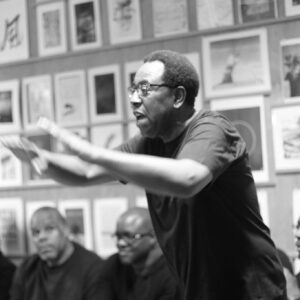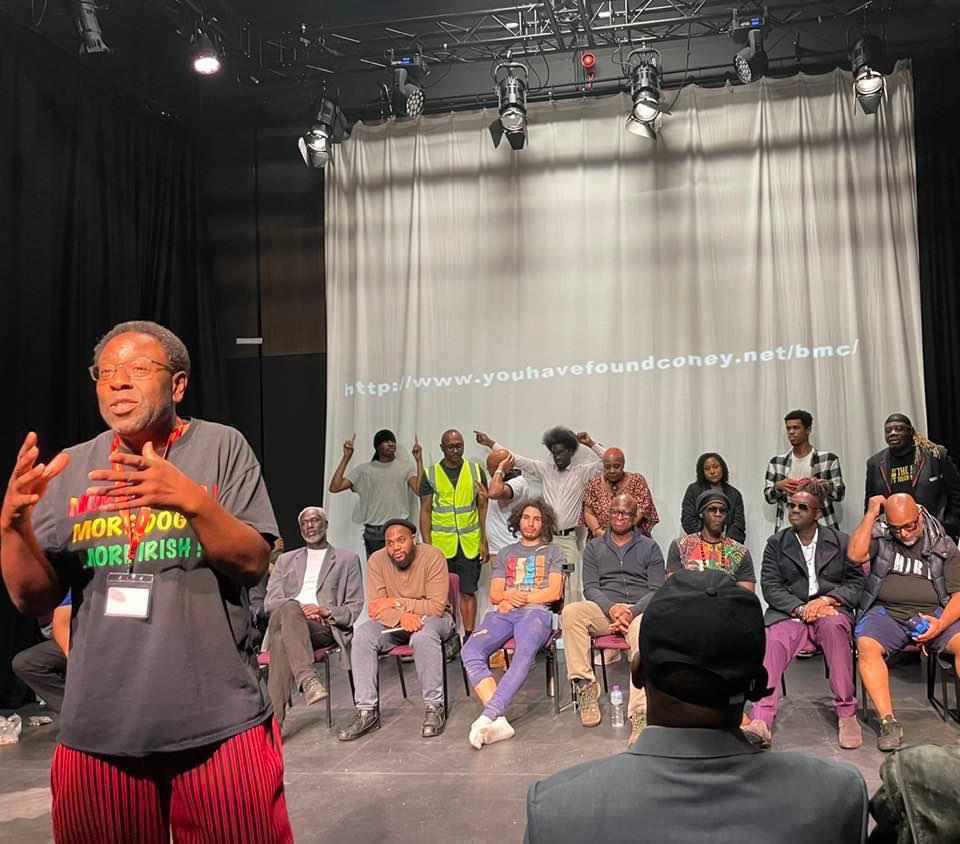About
I work with businesses, charities, councils and communities in cities and across the UK and internationally to hold space for people to have the time they need to make positive change. I lead and support skills development for creatives and performance makers.

I’m passionate about using participatory democratic processes that are joyful, creative, and accessible to local citizens, advocates, and policymakers in order to co-create policies and practices towards an equitable and just society.
I’m interested in collaborating and partnering with artists, charities and community audiences who want to drive social change in how they think about, and experience the world.
I’m drawn to the beautiful voices of the unheard and the vision of the unseen. At the heart of my creative practice is improvisation which binds together all of my work. Whether on stage, in a rehearsal room or working with others, the practice and philosophy of improvisation is at the core of my creative process. By ‘improvisation’ I mean any emergent or iterative process that seeks to bring awareness to each unfolding moment and an understanding that positive change comes not from one person, group, or ideology but will grow from the symbiotic interactions between us.
I have been directly trained by various teachers, directors, mentors, and creative practitioners globally over the decades as much of the work I do is because of them including Julian Boal, Keith Johnstone, Alan Marriott, Mick Napier, Augusto Boal, John Wright, Saul Hewish, Chris Johnston, Clark Baim, Adam Blatner, Geo Britto, Barbara Santos and practitioners from the Theatre in Prisons & Probation Network, Applied Improvisation Network and Psychodrama & Sociodrama Network and Playback Theatre. I undertake regular contracts with British Council and other NGO’s (Nicaragua, Australia, Hawaii, Bolivia, Slovenia Canada, India, Jamaica, South Africa, and throughout Europe) and was recently commissioned by National Criminal Justice Arts Alliance, the National Body for Arts in Criminal Justice and Social Inclusion to run a series of train the trainer training programmes for educators.
I use drama and theatre to encourage self-awareness and to assist individuals in exploring the idea of change and the impact that it may have on their lives. Within this framework they consider the complex web of connections between personal behaviour, choice and responsibility and broader social, economic and political factors.
I also develop creative health projects and programmes that explore how people’s lives can be improved so that they thrive better. The projects and programmes themselves vary from more recreational, usually drama-based activities leading to theatre or digital multimedia productions, to projects and programmes that analyse and challenge behaviour and help them resist the forces of exclusion and institutionalisation as well build and develop key social/life skills.


Within these projects and programmes personal histories of a person can become the content of the session(s). Drama methodologies are used to explore the behaviour in question: what factors led to the problem behaviour/criminal action, could different decisions have been taken? Who suffers? What are the underlying drives?
I believe in the notion that individuals have the capacity to respond in different ways to pressures from friends, families or environment. Anti social behaviour is not always an inevitable consequence of personal difficulties, nor can it be validated as a career option. Other strategies are always available. To access and understand these however requires the participant to use imagination to deconstruct and critique what is familiar, and to envision alternative behaviours. The creative and performing arts have a particular appropriateness in offering a language within which these arguments and speculations can take place.
In my opinion and experience the most commonly cited benefits of my work (listed below) falls into two categories. One relates to the creative activity itself (e.g. participation in a drama workshop resulting in an improvement in performance skills). The other is a by-product of the activity (e.g. an increase in self-confidence or communication skills).
- Educational achievement (learning about through an arts subject – basic and key skills)
- Improved attitudes and behaviour
- A reduced rate of re-offending
- Better ways of relating to other people
- Artistic, personal and social development (self-expression, communication, problem solving skills, team work etc)
- Fosters family and community ties
- Enhances learners’ ability to lead fulfilling lives in the community
- Emotional justice & wellbeing
In addition to teaching I am a regular visiting lecturer at Central School of Speech and Drama, Rose Bruford, Central St Martins, East 15, Goldsmiths, Bristol, Leicester, UCL and Birmingham Universities in Applied Theatre/ Theatre for Social Change.
I created the UK’s only weekly forum theatre on the air Afro-Caribbean radio soap opera drama www.492kornaklub.com
I am currently working pan London delivering training to young people in the use of role play and interactive theatre techniques for creative ‘round table‘ workshops with officers and staff from Metropolitan police.
I’m working with Businesses, Community Groups, Residents, Artists and local Activists to identify ways we can keep the legacy of the yearly anniversary of the 1981 Brixton Uprisings https://81actsofexuberantdefiance.co.uk/
I’m co designing workshops and programmes that empower an intergenerational group of black and brown men to improve their mental health and wellbeing through creative weekly social justice activities https://theblackmensconsortium.com/
I’m also collaborating with a mixed group of children, young people, parents, community leaders, teachers, researchers, therapists, counsellors, health professionals, community groups, council staff, south london and maudsley and other stakeholders to identify ways we can improve the CAMHS service. http://camhsreimagined.com/
I’m a reference group member for https://www.culturehealthandwellbeing.org.uk/resources/creative-health-quality-framework
Facilitator for https://tutufoundationuk.org/ubuntu-round-tables-project/
Mentor to artists at https://londonartsandhealth.org.uk/about/the-artists-represent-recovery-network/
I use the https://londonplus.org/creative-health-impact-framework/ and https://www.culturehealthandwellbeing.org.uk/resources/creative-health-quality-framework in my practice
